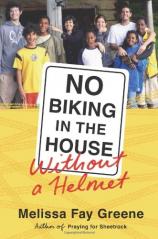Reading Group Guide
Discussion Questions
No Biking in the House Without a Helmet

1. How does the Greene/Samuel household compare to your family? Did you --- or did your parents --- grow up with a houseful of brothers and sisters? What was that like? Did you ever entertain thoughts of raising many children? What does a child gain by having half a dozen or more siblings? What does a child lose?
2. What surprised you the most as Melissa described her initiation into the international adoption process? Were you surprised to learn about sometimes misleading adoption agency promotions and about the dire conditions of some institutionalized children? What happens when a child’s physical, cognitive, or emotional needs overwhelm his or her new parents?
3. How did Melissa balance her research into the medical aspects of international adoption with her heartfelt desire to adopt a child? Have you had parenting or other life experiences in which your heart pulled you in one direction while your head led you in another? Have you ever felt frozen between turning a blind eye to the truth and losing your courage as a result of fact-finding? How did you strike a balance and move forward?
4. The title represents a type of ridiculous warning parents sometimes find themselves obliged to say to children. Melissa mentions others, including “I want you to hit each other outside!” and “Please don’t wrestle with the scissors near the baby.” Can you share any absurdities you were forced to say to your children? What does the book’s title say about Melissa’s approach to parenting?
5. How did the chapter “Everything You Always Wanted to Know About Sex, but Couldn’t Spell” compare to your adolescent sex education and/or the education of your adolescents?
6. The ability of children to play is pivotal at several key moments, including Jesse’s assimilation into family life, Melissa’s introduction of whoopee cushions and Twister to Helen’s orphanage, and Sol and Daniel’s peace pact. In 2010, the United Nations codified a new Millennium Development Goal for the world, entitled “Sport for Development and Peace.” Talk about ways in which play and sports can overcome social, economic, cultural, racial, national, and cognitive barriers between people.
7. Sol’s story contains many unique elements, including a warm connection between his biological grandmother and his adoptive parents, and the revelation that his mother is still living. What values has this somewhat unusual “international open adoption” imparted to his life and the family’s?
8. Yosef and Daniel became part of the family at the urging of Lee. What inspired Melissa and Don to trust an 18-year-old’s intuition that the Gizaw brothers, then ages nine and twelve, should be part of the Greene/Samuel family? What would have been the scariest consideration for you in facing such a decision? What factors might have given you the courage to proceed or convinced you to say no?
9. It takes financial resources to house and feed children, but Melissa and Don seem to have chosen the route of “rich in love” rather than “rich” in more practical ways. What family values can be relayed to children regardless of a family’s socioeconomic standing? How can well-off families impart to their children the importance of battling poverty and injustice?
10. The book’s descriptions of Ethiopian cuisine reveal the power of food as a link to our roots. What recipes capture your childhood? What special meals will your own children remember (either fondly or with horror) as touchstones of their childhood?
11. Like most adoptive parents, Melissa and Don immerse their new children in their own heritage, including religious traditions. Yet they also attempt to help their children preserve ties to their birth countries and to their first families. What is your experience of trying to respect and sustain more than one language or more than one cultural, national, or religious tradition in your home?
12. How did sibling relationships evolve during the arrival of more and more children? How do brotherly bonds seem to differ from sisterly bonds? What steps did Melissa and Don take to try to build unity among all nine children?
13. Upon Helen’s return visit to Ethiopia in 2007, she is overwhelmed by the widespread suffering. She tearfully asks, “What makes a country rich or poor?” What would you have told her that day?
14. Do you have personal experience of adoption or foster care? How would you compare your experiences with those described in No Biking in the House Without a Helmet? Is adopting or fostering a baby or older child something you would consider in life? Is it helpful to read that there could be difficult hurdles along the way, or would you prefer not to know in advance? Would you find the angels and storks and kitties of adoption agency websites alluring, or would you prefer to hear harder truths up front?
15. Are you acquainted with Melissa’s earlier books, Praying for Sheetrock, The Temple Bombing, Last Man Out, or There Is No Me Without You? Though she has written about the civil rights movement, a historic coal mine disaster, and the current HIV/AIDS pandemic and orphan crisis in Africa, her books all focus on unsung heroes and on struggles for racial or economic justice. No Biking in the House Without a Helmet is her first memoir and her first truly light hearted book. Are themes of justice and heroism also discernible here?
No Biking in the House Without a Helmet
- Publication Date: April 12, 2011
- Hardcover: 368 pages
- Publisher: Sarah Crichton Books
- ISBN-10: 0374223068
- ISBN-13: 9780374223069







